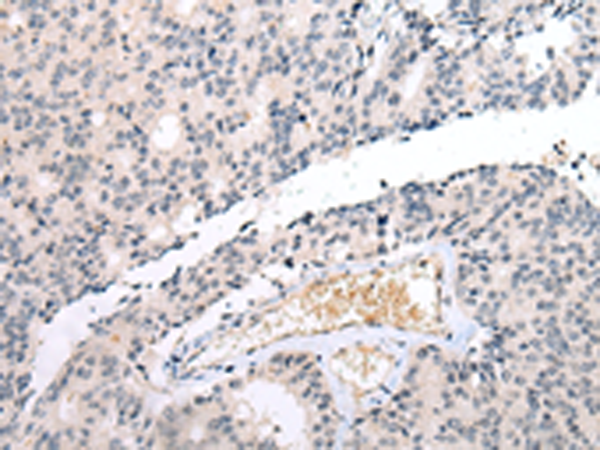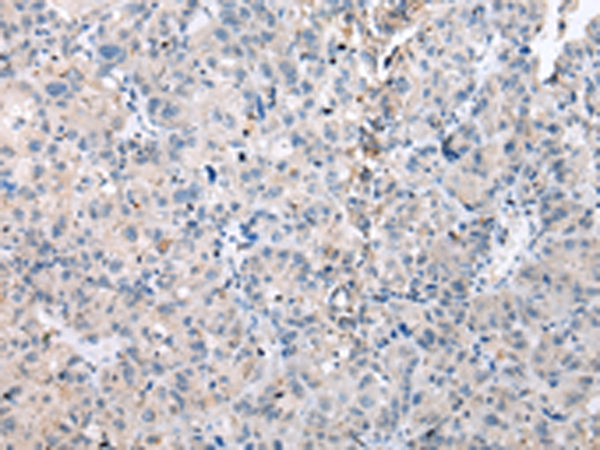

| WB | 咨询技术 | Human,Mouse,Rat |
| IF | 咨询技术 | Human,Mouse,Rat |
| IHC | 1/10-1/50 | Human,Mouse,Rat |
| ICC | 技术咨询 | Human,Mouse,Rat |
| FCM | 咨询技术 | Human,Mouse,Rat |
| Elisa | 1/1000-1/2000 | Human,Mouse,Rat |
| Aliases | MKP4; MKP-4 |
| Host/Isotype | Rabbit IgG |
| Antibody Type | Primary antibody |
| Storage | Store at 4°C short term. Aliquot and store at -20°C long term. Avoid freeze/thaw cycles. |
| Species Reactivity | Human |
| Immunogen | Synthetic peptide of human DUSP9 |
| Formulation | Purified antibody in PBS with 0.05% sodium azide and 50% glycerol. |
+ +
以下是关于DUSP9抗体的3篇参考文献示例:
---
1. **文献名称**:*DUSP9 regulates placental development and fetal growth in mice*
**作者**:Li, X., et al.
**摘要**:本研究利用DUSP9特异性抗体,通过免疫组化和Western blot技术,发现DUSP9在小鼠胎盘滋养层细胞中高表达,并揭示其通过抑制ERK/MAPK信号通路调控胎盘血管生成和胎儿生长缺陷的机制。
2. **文献名称**:*DUSP9 acts as a tumor suppressor in endometrial cancer via modulating p38 signaling*
**作者**:Wang, Y., et al.
**摘要**:作者通过DUSP9抗体进行免疫印迹和免疫荧光实验,证明DUSP9在子宫内膜癌组织中表达下调,其缺失导致p38磷酸化水平异常升高,进而促进肿瘤细胞增殖和侵袭。
3. **文献名称**:*DUSP9 deficiency exacerbates hepatic insulin resistance via JNK pathway activation*
**作者**:Zhang, H., et al.
**摘要**:该研究利用DUSP9抗体在肝脏组织样本中检测蛋白表达,发现DUSP9敲除小鼠因JNK信号通路过度激活引发胰岛素抵抗,提示DUSP9在代谢调控中的潜在治疗价值。
---
以上文献为示例,实际引用时需核实具体来源及细节。如需最新研究,建议通过PubMed或Web of Science以“DUSP9 antibody”为关键词检索。
The dual-specificity phosphatase 9 (DUSP9), also known as MAP kinase phosphatase 4 (MKP-4), is a member of the dual-specificity phosphatase family that regulates mitogen-activated protein kinase (MAPK) signaling pathways. DUSP9 specifically dephosphorylates and inactivates extracellular signal-regulated kinase (ERK), p38. and c-Jun N-terminal kinase (JNK), thereby modulating cellular responses to stress, growth factors, and cytokines. It is primarily expressed in placental, kidney, and liver tissues, and has been implicated in embryonic development, glucose metabolism, and cancer progression.
DUSP9 antibodies are essential tools for studying its expression, localization, and function in physiological and pathological contexts. These antibodies enable detection of DUSP9 protein levels via techniques like Western blotting, immunohistochemistry (IHC), and immunofluorescence (IF). Researchers utilize them to explore DUSP9's role in regulating MAPK signaling cascades, particularly in disorders such as diabetes, obesity, and certain malignancies. For instance, studies highlight DUSP9's involvement in insulin signaling and its potential as a therapeutic target for metabolic syndromes.
High-quality DUSP9 antibodies are validated for specificity, often through knockout cell line controls, ensuring reliable experimental outcomes. Commercial antibodies are typically raised in rabbits or mice, targeting specific epitopes within the conserved N-terminal or catalytic domains. Understanding DUSP9's regulatory mechanisms through antibody-based assays advances insights into cellular homeostasis and disease pathways.
×